Currently, I am in Hyde Park, New York, combing through the archives of President Franklin Delano Roosevelt. Have you heard of him? Of course you have! He was a pretty big deal. Not only was he elected when over a quarter of Americans were unemployed during the Great Depression – pulling them out of their collective misery through massive public works projects and reviving America’s trust in the economy through weekly radio broadcasts called “Fireside Chats”– but he also held office during one of the deadliest wars in American history. Oh, and he was crippled too. Having contracted polio in his 30s, he was the only physically disabled president to be elected to office. Ever.

FDR served as US President from 1933 to 1945. Here’s a flattering photo, courtesy of Densho Encyclopaedia
Considered the most influential president of the 20th century, FDR’s impact has been felt ever since. Under his watch, unions were given the right to form. His government was the first to provide old-age security, unemployment benefits and disability and single-parent allowances. He introduced the American public to a new relationship with its government by calmly discussing the issues of the day over the radio while they sat comfortably in their homes. He declared that the role of the central government was to secure the material well-being of the American people. Having enacted the Executive Reorganisation Bill in 1939, he broadened and increased the presidency’s overall responsibilities. He supported the United Nations and ensured the US had a key role in the UN’s Relief and Rehabilitation Administration (and thus, a key role in reshaping post-war Europe). FDR substantially changed America, and its position in the world.
But FDR also had major flaws. Politically, he broke the no-third-term rule in 1940 and sought to centralise the power of the presidency, leading some to question if he would become a dictator. Under his command, he allowed the harsh internment of Japanese-Americans on the west coast. After his death, many questioned why Roosevelt never took a leading role in helping the Jews of Europe, leaving their welfare instead to private organizations and charities. Some claimed he was a racist. Others said he was just a narcissist.
FDR also had an unusual personal life. He was a proper Mama’s boy. The closeness to his mother created a toxic atmosphere, leaving little emotional room for anyone else. Despite his mother’s fierce opposition, he married his rather remarkable wife, Eleanor. They were cousins, albeit distant. But Eleanor was unusual too; she was an independent thinker and terribly clever, likely a lesbian, and eventually became a politician in her own right in the 1950s.
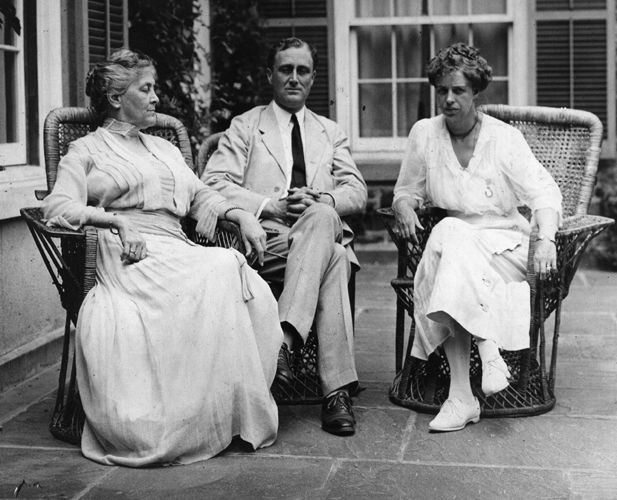
Sarah Roosevelt was a clever and educated woman who apparently doted on her son. At age 26, she married FDR’s father, James, 52 years old. The birth was difficult and she bore no other children. After James’ death in 1900, she held the majority of the Roosevelt fortune. Sarah died in 1941.
The Roosevelts had an odd relationship, which historians have commented served political ends rather than being a romantic union. But, they did produce six children! While Eleanor advocated for women’s rights and various social reforms, FDR pushed his own career towards vice presidency then eventually presidency. He dealt with a painful disability daily and he adequately “overcame” the perception of it (apparently, people didn’t realise the extent of his immobility because he was so excellent at hiding it in public). He even created a foundation and rehabilitation park for other polio victims in Well Springs, Georgia.
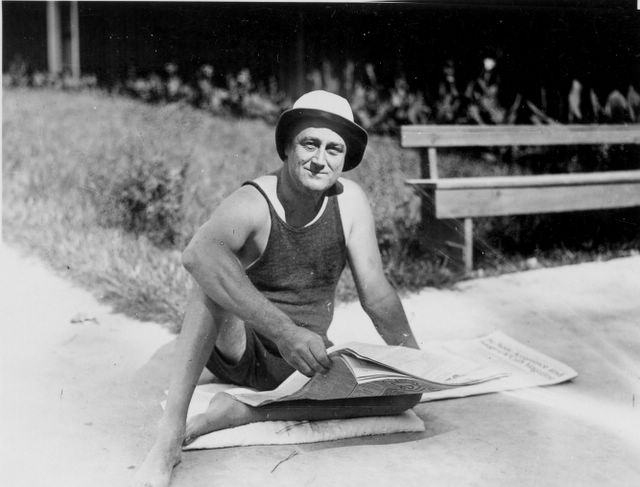
FDR had contracted polio while at his summer home in Campobello, Canada, in July 1921. He was just 39 years old. He eventually founded a home for other polio victims in Warm Springs, Georgia, depicted here in 1924.
Affairs were rampant in the Roosevelt household. FDR kept close company with Eleanor’s secretary, Lucy Mercer and, later, his own personal secretary, Marguerite “Missy” LeHand. Meanwhile Eleanor formed “close” relationships to like-minded women, going on holidays with them regularly, all with FDR’s blessing. He even built a small cottage for Eleanor and her friends to have sleepovers just two miles from the family home in Hyde Park. After her husband’s death, Eleanor became a chief philanthropist in post-war Europe, advocating for human rights (and especially children’s rights) in the new United Nations. Evidently, the Roosevelts lived remarkable and unusual lives, both together and apart.
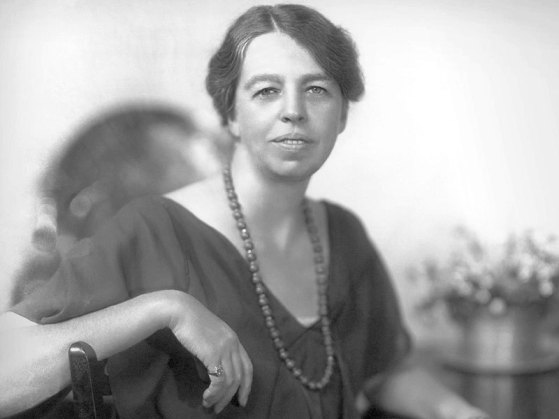
Eleanor Roosevelt is celebrated as one of the most influential women of the 20th century. She pushed for social reforms, women’s rights, and human rights, offering her help and influence to marginalised groups and fringe societies. Notably, Eleanor was chair of the United Nation’s Human Rights Commission and, in 1948, was the chief proponent of the Universal Declaration of Human Rights.
In 1941, just a few years before FDR died, he oversaw the construction of the FDR Library and Archives on his family estate in Hyde Park. Not long after his death, his immediate family relinquished their rights to the estate and, at FDR’s request, it became a national park. Today it houses multiple series of the Roosevelt’s papers, with over 20,000 boxes of documents.

The FDR Library. Critics claimed FDR’s library was a shameful display of self-promotion, but he claimed it accomplished two goals: preserve documents and provide transparency of all his actions to the American people.
This brings me back to why I’m here. Considering the complexity of these multi-faceted pillars of American history, it is important to approach the Roosevelts with caution and respect, right?
But it’s tricky. As a historian, it’s hard to remain objective when you want certain things to be true. Or, when your research subject is just as controversial as the Roosevelts.
While Eleanor intrigues me, I am actually here for FDR alone. I want to discover why FDR was an obstinate and obstructive SCHMUCK to his closest ally, the British, during the Second World War. Let me explain…
During the Second World War, one of the most powerful weapons the Allies held against Nazi Germany was the economic blockade of Nazi-controlled continental Europe. ALL trade, including relief, sent by the Allies to Germany OR German-occupied countries was strictly forbidden during the war. This prevented Germany from plundering relief, while also forcing Germany to take full responsibility for the territories it conquered. Over time, the blockade would apply considerable pressure upon Germany and strain its resources and, thus, its ability to win the war. Seems logical, right?
The blockade policy was one of those items that was constantly discussed by all levels of multiple governments. I’ve witnessed this in the German, British, Swiss and now American archives. It’s incredible. And surprisingly, very rarely discussed by historians in any great detail (see Meredith Hindley or Jean Beaumont’s “Starving for Democracy”).
Public pressure from various groups (for example, thousands of letters written by concerned Yorkshire women’s groups or Pennsylvanian famers or Belgian mothers or various Red Cross branches) meant that governments were always rejecting pleas for relief from well-meaning citizens, large reputable charities, or governments in exile. And, due to Germany’s considerable exploitation of its conquered territories, the list of those governments begging for relief was very long: Polish, Belgian, Norwegian, Dutch, French, Yugoslav…
But blockade policy remained practically unyielding. (The single exception during the entre war was Greece because of a massive famine, but you can read about that here). So long as the Allies could hold it together, maintain unity on this key war policy, then the blockade have the strongest effect on the enemy.
But humanity is cunning. Swiss charities sought to overcome the blockade by relocating children to Switzerland instead. Massive child evacuations, which is the core of my research, successfully relocated Belgian, French and Yugoslav children to Switzerland for three month periods of recuperation. And the Germans allowed it! No great inconvenience to them, because it removed many mouths to feed and pacified parents. Over 60,000 children were successfully evacuated in this way during the war, and another 100,000 in the post-war period. Impressive, eh?

Swiss Red Cross nurses prepare to receive thousands of French and Belgian children at a train station in 1942 in Basel, Switzerland.
However, this changed in August 1942. Hitler’s armies invaded southern, unoccupied France and, soon after, began large round-ups of Jews. Initially, Jewish children were not included in the deportations to the East, which meant that thousands of children were abandoned and parentless. (A few weeks later though, the Germans rounded them up too).
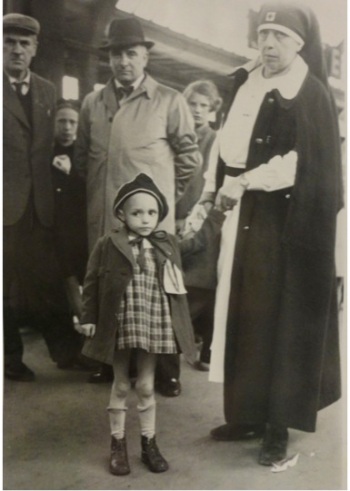
A Belgian child (4 years old) with severe malnutrition at a Swiss train station, 1942.
Due to this invasion and deportation, thousands of French children now needed immediate relief. Swiss charities grappled with how to help. They approached the Allied governments that perhaps these Swiss-run evacuations could be increased – possibly to over 100,000 children! But, crucially, Switzerland too was experiencing war shortages – it could not adequately provide for all the children of Europe. So perhaps the Allies would send relief (food, medicines, vitamins) directly to Switzerland for all these children? Of course, the Swiss emphasised, they were neutral, not Nazi-controlled, so they were excluded from the Allies’ blockade policy.
It all sounds very logical. A clever and elegant solution to a major humanitarian crisis. While memos shot excitedly across the Atlantic between the US State Department and the British Foreign Office, dear President Roosevelt was having informal meetings with the Ambassador to Norway, Wilhelm Thorleif von Munthe af Morgenstierne. According to strongly-worded and angry British documents, in late October 1942, FDR promised the Ambassador – without consulting the British – that the US would send relief to Norway!
When the British heard of FDR’s assurances, they insisted that there was no way that relief could be sent to Norway without it being allowed also to Belgium, France, Poland, etc, thus breaking the blockade! Also, FDR’s promises complicated the possibility of sending relief to children evacuated to Switzerland, which would both relieve children while also respecting the blockade. Therefore, the British emphatically conveyed their absolute rejection of FDR’s promises to Norway in November 1942 and keenly awaited the American reply.
However, no reply was given. British documents reveal acute frustration and abhorrence that the US would ignore the British regarding such an important subject, to such an extent that Churchill himself was lobbied to become involved. And although Churchill and FDR met at the Casablanca Conference in January 1943, the British government still received no official reply. WHY?
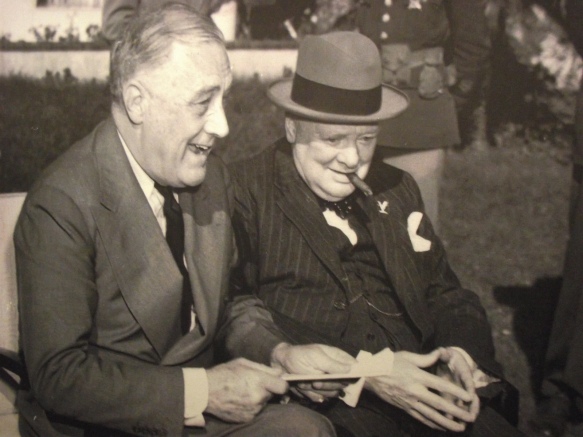
FDR and Churchill were close allies during the war. The complete (and overwhelmingly detailed) correspondence was compiled by Warren F Kimball in THREE volumes. Notably, when writing informally, Churchill was referred to as “Former Naval Person.” Only in official correspondence was his title “Prime Minister,” indicating the intimacy of their relationship.
By August 1943, the Americans finally gave a half-hearted, vague and conditional reply that they might support extra provisions to Switzerland, but the British, Swiss and Americans took no action. Allied support for child evacuations was not raised again between the British and US until May 1944, just one month before the Allied invasion of Europe on DDay. Of course, by that point, a humanitarian mission for children was hardly as important as the rapid liberation of oppressed nations by the largest invasion in history.
BUT.
Why did FDR promise such a thing to Norway? Was it during a schmoozy, drunken lunch or a formal high-level meeting? Was the promise conditional or was it a blank cheque? Did the Norwegian Ambassador perhaps misunderstand FDR’s “promise” and in fact, no promise was made? Or was FDR’s “promise” actually hollow – perhaps a vain attempt to get the insistent Norwegian off his back – and the British were just overreacting? But then, if that was the case, why would FDR not reply immediately to his ally? Why ignore their determined attempts to find out what happened? WHY? Why, oh President Roosevelt, why?
Meanwhile, let’s all remember: children are starving, being rounded up and sent to concentration camps, experiencing violence and bombings and general oppression. This makes any bureaucratic error or deliberate avoidance all the more inexcusable.
This is the purpose of my research visit. To discover the answer to these questions. My current historical opinion of FDR is not too complimentary. But even I know it’s not fair to FDR, his legacy, or the study of history to jump to conclusions. Which brings me back to my original assessment of FDR…
President Roosevelt was obviously a brilliant politician and, in many ways, a great strategist. His lasting legacy is a testament to his commendable, practical approach and determination to improve American lives. But he also prioritised certain lives over others, and was a blatant narcissist. FDR liked being in control – to such an extent as being classified as a dictator – and sought personal validation from various audiences. Some legitimate, and some behind closed doors.
A large part of good historical research is accurately determining the motives, personalities, and fears of major historical figures. Both the problem and beauty of studying FDR as a historical topic is that he was just as flawed as he was extraordinary. Throughout his remarkable but challenged life, he engaged with a broader spectrum of victory (and failure!) than others, so predicting his motivations will be exceptionally difficult. He is an infinitely complex character.
My hunch about the whole promising-relief-to-Norway thing? Based upon all the research, documentaries, articles and books I’ve had to read about the man, FDR was NOT impulsive. FDR was deliberate and purposeful. Everything he did was meaningful and goal-oriented. He was an impeccable strategist. Therefore, I truly think that President Roosevelt had a reason behind his promise to Norway. Now, I just need to figure it out…
Wish me luck!